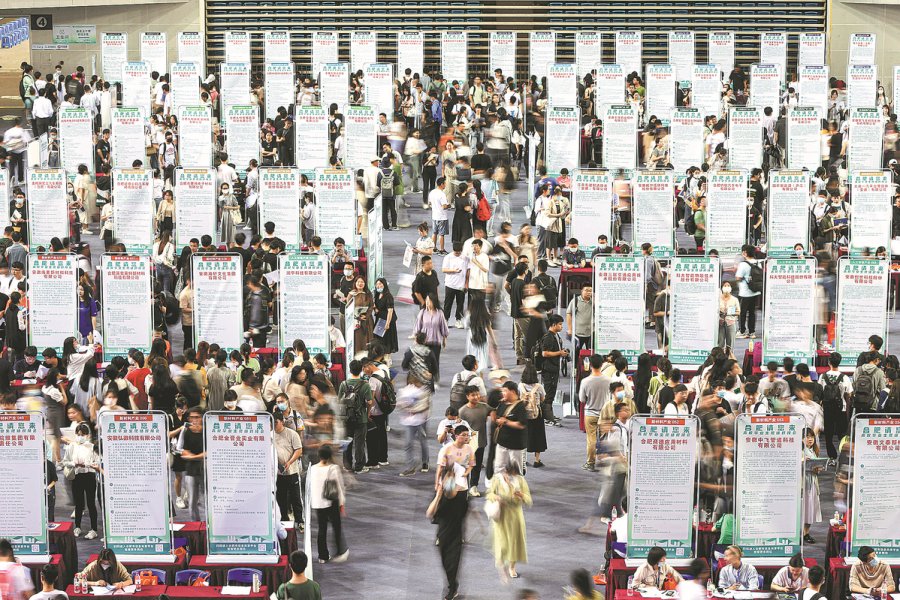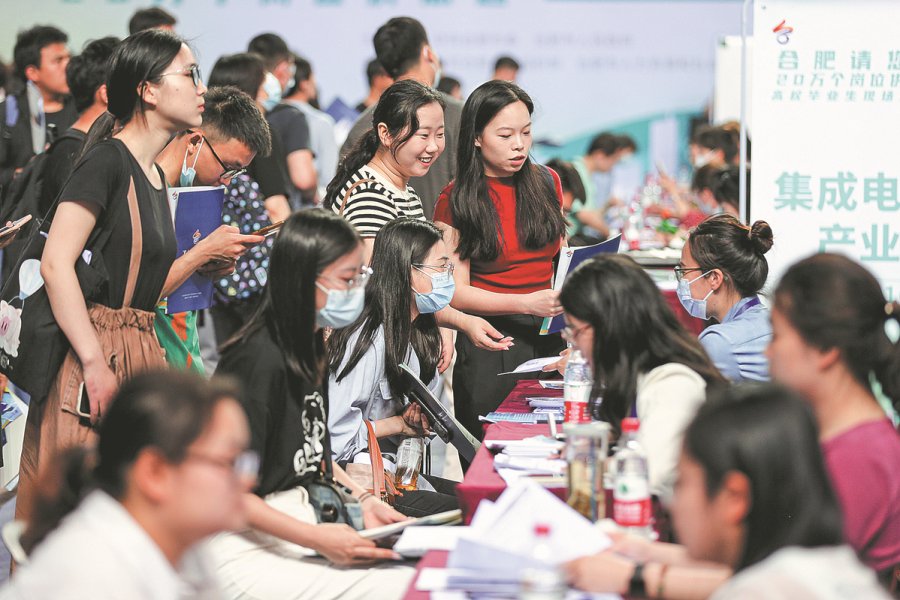July 12, 2023
BEIJING – While they find China’s high global standing reassuring, college leavers are anxious about growing competition in the job market. Yan Dongjie reports.
The annual college graduation season is just drawing to a close. As most of this year’s graduates were born in 2000 or 2001, they are the first of the “00’s generation” to leave the campus and enter the workplace.
These graduates also have a second defining characteristic: three of their four years of college life were dominated by the COVID-19 epidemic, so they stayed home to take online classes or were quarantined in their dormitories. Some said they were surprised to have graduated without having eaten in every one of their school’s canteens.
Those factors have left two marks on them: a sense of security engendered by the favorable economic environment that has cushioned their young lives, while conversely they are anxious after the epidemic and as a result of the growing competition for jobs.
Zhang Xiaojing, who was born in September 2000, graduated from Beijing Jiaotong University with a bachelor’s in internet journalism. Like her peers, she is skilled in the use of a range of news software, self-media platforms and social media apps. She took many online classes at home, and the huge amount of information flowing from the internet meant that even from her earliest days at university she learned to think, be discerning and plan.
“My generation is exposed to too much information, so when making future life choices, we need a stronger ability to sift through information. If you make a big life choice in a confused way, the risks are bigger than before,” she said.
With a plan for her future career in mind, she began an internship in the summer of her sophomore year. After trying five different companies and units including iQiyi, Tencent and traditional media she decided to undertake postgraduate study.
“I tried a few different jobs and fluctuated between the feeling that I was the right fit or the wrong fit. I need more time to look at it and try more things in different areas,” she said.
“School is a very special period when we can learn social behavior and even make mistakes. We still have a lot of experience to gain, so we want to continue to obtain it as students, which I think comes at a relatively low cost. I will have to work for several decades, but my educational life is less than 20 years, so there’s no hurry.”

A job fair for college graduates is held at the Hefei Sports Center in Anhui province on May 29. WANG YISHENG/FOR CHINA DAILY
Practical experience
Kong Zhiyu, Zhang’s classmate, said that this year’s graduates enjoyed their internships very much, and they believe that learning in school and practicing in the workplace are equally important ways of gaining experience. Even though they are not yet 23 years old, many say that they are already “internship veterans”.
He said that interning taught him a lot: in addition to improving his basic working ability, he is better at writing resumes after interacting with employers and he has identified the things he needs to do to supplement his knowledge and ability.
“The practical experience also made me more realistic,” he said. “In school, we don’t have a clear idea of what kind of talent society needs or where we stand among our peers. But after working with employers, we tend not to be too shy or arrogant, we can find our own level and have more realistic expectations for the future.”
One of his peers, Wu Di, a Spanish major who graduated this year, said that today’s college students are “caught up” and that the anxiety and insecurity they feel mainly come from peer pressure to work hard.
Wu said his former classmates still feel uneasy and anxious, despite having consulted with their predecessors and teachers about their experiences, formulated future work plans and interned and interacted with employers since their early years in college.
“If you measure anxiety on a scale of zero to 10, this generation would register as eight to 10,” he said.
“In recent years, we have felt that there are too many uncertainties in the world. When it comes to work and the future, it seems that the only certainty is making money. So when I made a career choice after graduation, the salary was the first factor I considered, followed by the growth brought by the job, realization of personal value and a few other things.”

Graduates hand in their resumes and question recruiting agents about work at the job fair. WANG YISHENG/FOR CHINA DAILY
‘Sense of security’
In interviews for this article, the phrase “Searching for a sense of security” appeared frequently among this class of graduates.
Wu said that he needs to make money to gain that feeling. Meanwhile, some of his peers chose to take the civil service exam, while others preferred jobs that provide household registration in Beijing. Some simply chose to work for State-owned enterprises or large companies because that made them feel more secure.
Wang Hongying, Party secretary of the School of Languages and Communication Studies at Beijing Jiaotong University, said there are big differences between today’s graduates and those of 10 years ago.
According to Wang, today’s young people are focused more on their feelings than on rational thought when they make choices. For example, they pay more attention to the working environment and company culture, and they have more patience to wait to “grow up”.
“In the past, we heard that many college graduates overseas were taking gap years, and this phenomenon is becoming more and more popular in China. Some use the break to retake the graduate school entrance exams or go abroad for further study, while others just want to stop and ‘wait for themselves’ (to understand their own needs),” she said.
“The country’s economic development has given this generation a sense of security,” she said. The 20 years during which this generation grew up was also the time in which China developed from being relatively well-off to well-off. “So they grew up with a certain sense of security. This is the confidence that the country’s development has brought to this generation,” she said.
In China, the school entry age is 6 years old, so children born in the second half of 2000 and the first half of 2001 started school in 2007, went to college in 2019 and graduated this year.
“This generation is regarded as a lucky one because its members grew up in a favorable environment. However, at the same time, it is also an anxious generation, and these young people may face greater employment pressures,” Wang said.

Hou Jianguo (second from right), president of the Chinese Academy of Sciences, shakes hands with students during the graduation ceremony at the University of the Chinese Academy of Sciences in Beijing on July 1. ZHU XINGXIN/CHINA DAILY
Glut of applicants
Those pressures are likely caused by the large number of graduates and also because young Chinese who graduated from schools overseas returned during the COVID-19 outbreak, resulting in a glut of applicants on the job market. In recent years, students have felt more employment pressures.
“From society’s point of view, what we are pursuing is the reduction of occupational disparity: that is, whether it is government units, large or small, State-owned or private enterprises, the differences between them are narrowing. Many developed countries have gone through this phase. We have not been able to achieve development and balance in such a short period of time, so this is the next problem to be solved,” Wang said.
Wu, the graduate in Spanish, said: “Each generation has its own mission and topic. We need to acknowledge the fact that this generation is approaching its problems calmly. Looking on from a distance and saying that we are relaxed or we are distressed are both excessive generalizations, and I think they are unnecessary.
“I am a big believer in making the best choice for yourself at any given moment. Keep doing that and you’ll get the best life you can achieve.”


